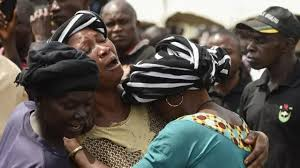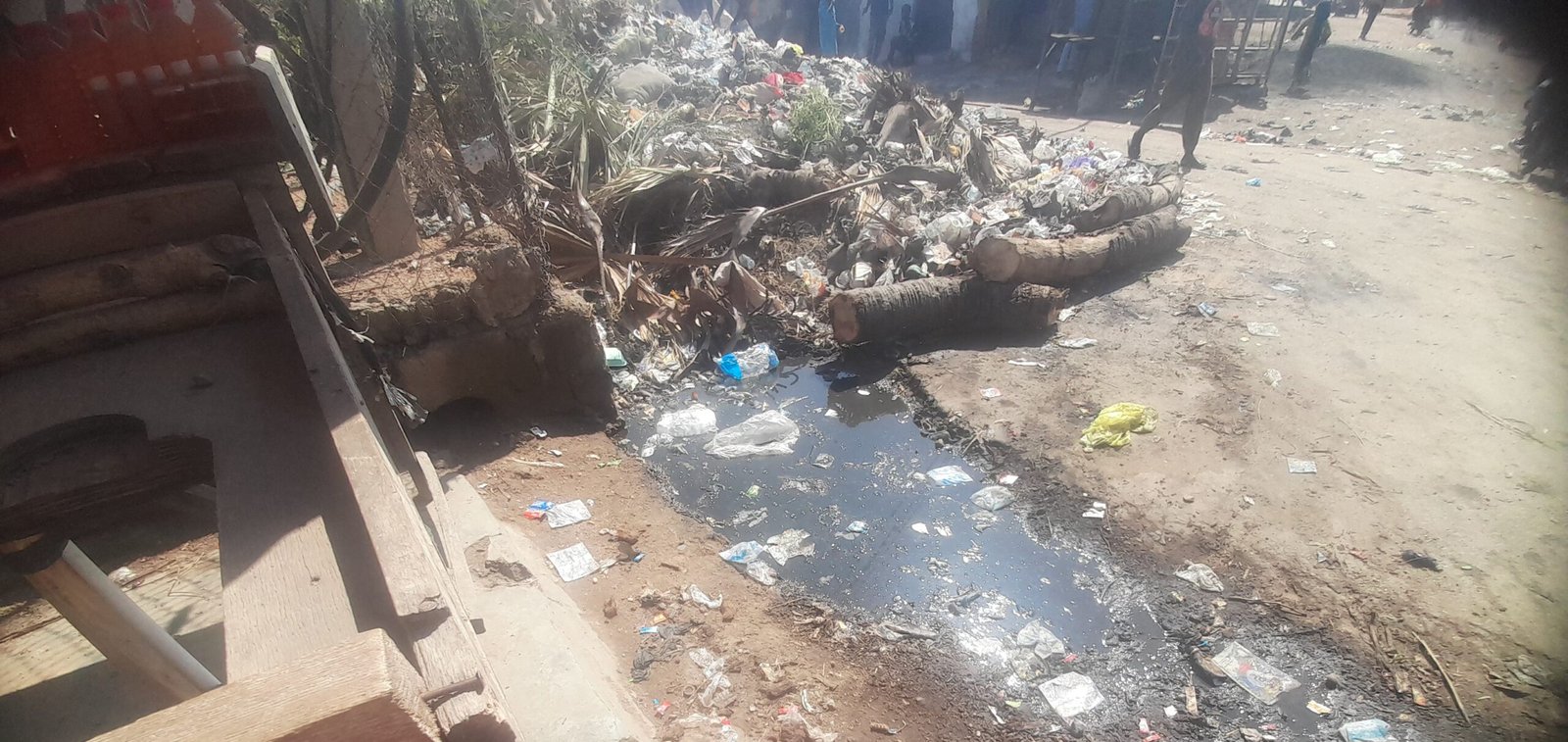Due to vicious attacks and killings by terrorist groups and sometimes gunmen not linked to bandit or kidnap groups communities across the length and breadth of Nigeria are rising in self-defence in their determination to protect their lives. But their zeal to help themselves where the government seemed not forthcoming in its constitutional responsibility has produced some dire consequences in recent time.
Hussaini Kafi in Kano reports how innocent and unsuspecting Nigerians have been sent to their early graves in weird circumstances-cold blooded murder, massacre and cruel killings. Bestial action is growing in the country and there are great concerns that it will prove difficult to contain.
The brutal killing of 13 Kaduna indigenes in Plateau State has triggered a wave of national outrage, with community leaders and security analysts warning that the government’s failure to ensure justice is driving citizens to take the law into their own hands. The barbaric action has continued.
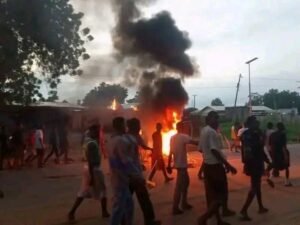
The victims, mostly women and children from the Basawa community in Zaria, Kaduna State, were ambushed on June 20 in Mangun District of Mangu Local Government Area while traveling in an 18-seater Ahmadu Bello University bus for a wedding in Qua’an Pan LGA. They reportedly stopped to ask for directions when hoodlums attacked them.
The Chief Imam of Jama’atu Izalatil Bid’a Wa’ikamatis Sunnah in Mangu, Suleiman Haruna, who led the funeral prayers, confirmed that nine were buried at Hayi Muslim Cemetery on Saturday, and four others were buried in Quaapan on Sunday. “Yes, the deceased have been buried,” he said. “Eight persons and another who later died were buried in Mangu, while four were moved to Quaapan and buried there.”
No Condolence from Plateau Government
During a condolence visit by former Minister of Youth and Sports, Solomon Dalung, the Emir of Zazzau, Ahmed Bamalli, expressed dismay over the Plateau Government’s silence. “As at the time of your visit, no official delegation from the Plateau Government has come to Zaria to condole with the victims’ families or assess the situation,” the emir said.
Dalung, while speaking to journalists at the palace, described the killings as “devastating and shameful,” and stressed that such incidents could have been prevented if the government had taken proactive measures. “These people were only trying to celebrate a marriage and were killed for no reason,” he said. “We expect more from our leaders.”
Mounting Frustration Among Northerners
Community members told AHR that the lack of a government response was deepening resentment. “If this had happened to people from Plateau in Zaria, Kaduna State would have sent a delegation,” said Alhaji Sani Ahmed, a resident of Unguwa-Uku in Kano. “Why is it so difficult for Plateau to do the same?”
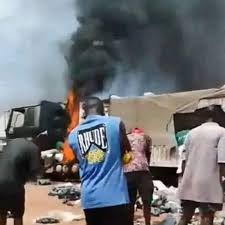
Observers have drawn comparisons with the March 14, 2024, killing of 16 Hausa hunters from Kano in Uromi, Edo State. In that case, Governor Godwin Obaseki sent a delegation to Kano and later established a committee to oversee compensation and investigation.
Edo’s Prompt Action, Plateau’s Silence
Governor Abba Kabir Yusuf of Kano, who received the Edo delegation, acknowledged the gesture as a step toward national unity. “It was painful, but we saw sincerity in the way Edo responded,” the governor said during a separate interview. “They visited us, they set up a committee, and that gave some hope of justice.”
Security analysts told AHR that the difference in how states react to violent incidents is fueling suspicion and bitterness. Retired Brigadier General Yekini Musa said, “When a state fails to act after a tragedy, it sends a message that some lives matter less. That is the kind of attitude that pushes communities to take matters into their own hands.”
Another Bloody Attack in Bassa
Joseph Chudu Yonkpa, the National Publicity Secretary of the Irigwe Youth Movement, reported a similar pattern in Bassa LGA, Plateau State, where three members of a Kaduna family were ambushed and killed in Te’ebbe community. “This happened while a peace committee was meeting. It’s not the first time. Our people are targeted during these meetings,” he said.
Two other victims from that attack—Esau Bala and Asabe Bala—were hospitalized in Jos. According to Yonkpa, attacks on farming communities have continued with little or no response from security agencies. “No one is being arrested. This is how impunity thrives,” he added.
The Dangerous Rise of Vigilantism
Dr. Halima Yunusa, a political sociologist at Ahmadu Bello University, said during a panel discussion in Zaria that the normalization of lawlessness is becoming a national threat. “When victims are ignored by their governments, they resort to vigilante justice. That’s why arms are spreading across rural communities,” she stated.
A senior police officer in Plateau State, who spoke on condition of anonymity, confirmed to AHR that local communities are increasingly arming themselves. “There is more illegal gun possession now than we’ve seen in years,” the officer said. “People say they no longer trust the government or police to protect them.”
He noted that while security agencies continue to disarm vigilantes, the lack of protection for remote communities is forcing civilians to organize self-defense groups. “Even religious leaders and traditional rulers are silent. The state must wake up,” he added.
Kano Governor Leads by Example
In contrast, Governor Yusuf of Kano personally attended the Janazah of two young men from Kano—Jamilu Ahmad and Barhana Suleiman—who were killed in Makurdi, Benue State. He was accompanied by National Security Adviser, Nuhu Ribadu, and other dignitaries.
“This is a tragic loss for us in Kano and for the country,” Governor Yusuf said at the National Mosque in Abuja. “The Benue State Government must act quickly to arrest and punish those behind this cruel act.”
He also used the opportunity to remind the Edo State Government to expedite the compensation process for the Hausa victims killed in Uromi. “Justice must not be delayed. Compensation and accountability are important for healing and national unity,” he added.
A Call for Equal Treatment
Civil society groups are now calling on Plateau Governor Caleb Mutfwang to follow the example set by Edo State. A joint statement by youth groups in Zaria and Kano noted, “We want justice, not revenge. But silence is dangerous. The Plateau Government must speak up, visit the families, and initiate a fair investigation.”
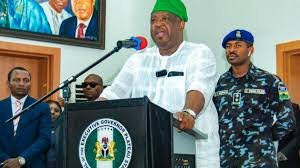
As security experts warn of escalating tensions, the call for justice grows louder. “If leaders continue to respond selectively, it will divide the country even further,” said Dr. Yunusa. “Every state must see the pain of others as their own.”
Way Forward: What Leaders Must Do
National cohesion cannot be built on selective empathy and regional silence. The Nigerian Constitution names state governors as Chief Security Officers. But more than the legal responsibility, citizens want compassion, responsiveness, and justice.
Security analyst Ibrahim Gambo told AHR, “People arm themselves when they lose hope. That’s what we’re seeing now. If governors act quickly after attacks—by visiting victims, sending delegations, or demanding justice—people will not feel the need to carry guns.”
He added that government inaction often leads to retaliation. “Communities interpret silence as complicity. That’s dangerous.”
Emir’s Warning Must Be Heeded
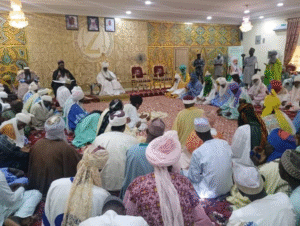
The Emir of Zazzau was explicit in his remarks. “The government must act now,” he said. “The Plateau State Government has not come to Zaria. They must do the right thing. These were innocent people.”
His statement was echoed by youth leaders in Kano who stressed that continued inaction could result in more avoidable violence. “We are seeing a breakdown of trust,” said Nasir Mohammed, a youth activist in Kano. “Government must rebuild it with action, not just words.”
Nigeria’s fragile unity depends on leaders who respond fairly to all citizens, regardless of ethnicity, religion, or region. The examples from Kano and Edo State offer a template for leadership in difficult times. Plateau State must not be the exception.

